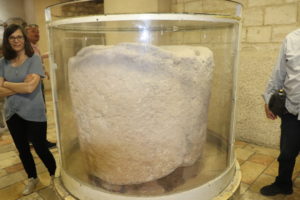by Gina Brummett | Apr 30, 2020 | Devotions

Like a modern “Deborah” Linda Bottoms rose to the challenge, coordinating the technical details of online network council. Linda serves as Assistant Church Ministries Director for Rocky Mountain Ministry Network (The Assemblies of God in Colorado and Utah).
All kinds of things have been preempted by the current pandemic. Today’s notable interruption was our annual, regional church conference (Assemblies of God Network Council). Our in-person gathering would have included rich fellowship with co-laborers, plus inspirational worship and workshops. But it was not to be, and our network leaders did a masterful job of adapting and conducting all the business and even an ordination service by video conference. We are grateful for solid, insightful leaders to navigate the challenges.
“Surreal” is the word my friend used to describe these days, but we understand that resilient people have weathered much more through the ages. The Prophetess Deborah, in her victory song, described a period of Israel’s history as lifeless.. After twenty years under the oppression of the Canaanite King Jabin and his cruel general, Sisera, Deborah said, “Village life in Israel had ceased…”
In a predominantly backslidden culture, Deborah stood out as a wise and God-fearing leader, to whom people flocked for advice and help. As Israel’s fourth judge, she was anointed with prophetic gifts, which enabled her to hear messages from God and to communicate his will to the people.
The Bible records that she “sent for Barak” and outlined God’s battle plan to defeat Sisera. Deborah accompanied Barak and, together, they recruited ten thousand men from the tribes of Naphtali and Zebulun. Their advance began with Deborah’s famous charge: “Go! This is the day the Lord has given Sisera into your hands.” Has not the Lord gone ahead of you?” (4:14)
Read the entire account in Judges, chapter four, including the gory details of Sisera’s demise at the hands of Jael, another female character in this dramatic story. The poetic fifth chapter that follows is the song of Deborah and Barak, praising God for his mercy and righteous acts on behalf of Israel.
Deborah marveled that God used her in bringing about this military victory. “Village life in Israel ceased, ceased until I, Deborah, arose, arose a mother in Israel.” It’s interesting that Deborah referred to herself, not as judge or prophet, but mother! (Side note: It may be the now home-schooling mothers, extra-motivated to return to some normalcy, who will rise to solve the current pandemic!)
Kidding aside, there are important lessons in Deborah’s story:
- Don’t shrink back from challenges “Get up!” “Go!” (4:14; 5:7)
- Continually seek God’s guidance and the path He has prepared. Has not the Lord gone ahead of you? (4:14)
- Recognize God will respond when you obey. At Barak’s advance, the Lord routed Sisera . . . (4:15)
- Appreciate those who are going with you! “My heart is with Israel’s princes, with the willing volunteers among the people. Praise the Lord!” (5:9)
Not many are called to lead an army, but many are called to lead a family or to influence co-workers and peers. There are examples all around of every-day but resilient friends who are courageously serving beyond their comfort zones. (Like our neighbor, a nurse, who collected gifts on her front porch. The parents of a newborn in her care had to forego their baby shower when quarantined, so the nurse put out a call for help from strangers.)
When it seems that “village life has ceased”, it takes a “Deborah”, and she just may look like YOU!
by Gina Brummett | Apr 23, 2020 | Devotions

Whatever things are lovely–especially to a Grammy!
Our plan (Jim & I) was to double team some blog posts about Cultivating Joy. Two special young ladies came aboard as surprise participants, illustrating (literally) joy in the midst of adverse circumstances. Yesterday’s post by Jim highlighted faithful perseverance that produces joy – the kind of joy that spills over onto others.
Just before I sat down to write my thoughts about the practicality of Philippians (a formula for joy), I received a photo of granddaughter Emilia creating some backyard art. Please indulge a little grandmotherly bragging and a side story. Some years ago, when Emi had drawn a particularly good picture, I said, “Emi, maybe you’ll be an artist when you grow up!” Her reply: “I’m an artist now!”
It’s the craziest of times and everyone is juggling so much. Families, like that of our daughter and son-in-law, are dealing with unique job stress, working from home, doing online school, taking turns on the household computers and managing all the responsibilities of a family of five plus pets! Both adults and kids are having to adapt to many challenges these days! Needing what her mom called a “brain break”, Emilia took paint brush and palette to the outdoors and used the wood pile as her canvas.
The Apostle Paul encouraged his friends at Philippi to take a brain break from their anxious thoughts, replacing them with positive meditations. His famous “Whatevers” map out a path to peace. Whatever is true, whatever is noble, whatever is right, whatever is pure, whatever is lovely, whatever is admirable—if anything is excellent or praiseworthy—think about such things. (4:8).
It takes some effort to discipline the mind in the middle of a crisis! A good exercise is to take pen and paper and list the specific “whatevers” that apply to the situation at hand. Regarding COVID-19, for example . . .
- True: Sickness is part of our fallen world, but healing is provided in the atonement.
- Noble: Self-sacrificing individuals, particularly those in health care, are working long, hard hours for the benefit of the entire community.
- Right: I have the ability to do good for my neighbors, “preferring one another” with the love of Christ.
- Pure: There are examples all around me of kindness that comes from compassionate, pure hearts. I am grateful for the kindness that has been shown to me.
- Lovely: The virus has not overcome the blossoming Spring. All around me are signs of life.
- Admirable: I admire the gifted minds that are researching this disease and developing strategies to overcome it. I pray for God to give them insight and understanding.
- Excellent: I am grateful for businesses that have adapted efficiently and are providing me with good service under difficult circumstances.
- Praiseworthy: Leaders at all levels of government are working hard at finding solutions to this pandemic. They are criticized and second guessed, and largely underappreciated, so I will acknowledge their efforts and pray for God to lead them.
Our wonderful Christa Mele, who fills so many ministry roles at Southwest Assembly of God, shared a video testimony of how God helps her in the struggle with anxiety. She, too, combats chaos with some “brain breaks”, specifically prayer, meditation and redirecting her attention to that which brings joy. You will find Christa’s message particularly inspiring for these times!
As he wrapped up his exhortation to the Philippians, Paul said, “Whatever you have learned or received or heard from me, or seen in me—put it into practice. And the God of peace will be with you.”
by Gina Brummett | Apr 17, 2020 | Devotions

“Nearby stood six stone water jars, the kind used by the Jews for ceremonial washing, each holding from twenty to thirty gallons.” (John 2:6) Photo by Gina Brummett, 2020, Stone water jar in Cana, Israel
“Listen to my Son.” God the Father said it; Mary the mother of Jesus said it; and Jesus, himself said, “Hear me.”
Matthew’s gospel records a fascinating story that has been labeled “The Transfiguration” because Jesus’ appearance was changed right in front of his inner circle of friends. (ch. 17)
After six days Jesus took with him Peter, James and John the brother of James, and led them up a high mountain by themselves. There he was transfigured before them. His face shone like the sun, and his clothes became as white as the light. Just then there appeared before them Moses and Elijah, talking with Jesus. . . While he was still speaking, a bright cloud covered them, and a voice from the cloud said, “This is my Son, whom I love; with him I am well pleased. Listen to him!” (Matthew 17)
It wasn’t the first time the disciples had heard similar words. Here on the Mount of Transfiguration –if they were clear-headed enough to remember it– they may have recalled another day when they had heard, “Listen to my son.” That time they were attending a wedding with Jesus and almost witnessed a ruined reception when the beverages ran out.
(From John, ch 2) “..a wedding took place at Cana in Galilee. Jesus’ mother was there, and Jesus and his disciples had also been invited to the wedding. When the wine was gone, Jesus’ mother said to him, “They have no more wine.”
“Woman, why do you involve me?” Jesus replied. “My hour has not yet come.”
His mother said to the servants, “Do whatever he tells you.”
The obedience of the servants saved the day as they participated in Jesus’ first miracle. The transformation of water to wine was done discreetly, but it was done in full view of the disciples and, apparently, as much for their benefit as for the wedding party and guests.
Through this miracle, Jesus “revealed his glory, and his disciples put their faith in him.” (See John 2:6-11)
When the disciples heard God’s voice on the mountaintop, they fell facedown , terrified but fully persuaded to listen to Jesus’ words that followed “Get up. Don’t be afraid.”
These two stories should compel us to listen to what Jesus says to us. Now, while you likely have some extra time at home -avoiding coronavirus- take the opportunity to research the “red letters”.* A transformation greater than “water to wine” happens for those who will “do whatever he tells you”. (i.e. Repent, Forgive, Love, Believe, Follow……) Hearing and obeying have a great outcome: “Everyone then who hears these words of mine and does them will be like a wise man who built his house on the rock.” Matthew 7:24
While we are not in the same position as the disciples to see Jesus’ physical features change in front of us, we do have the opportunity to behold His glory with greater clarity every day.
The Son says, “Get up. Don’t be afraid.”
*Jesus’ words typically printed in red in most editions of the New Testament. Click here for a compilation of “red letter” verses.
by Gina Brummett | Apr 8, 2020 | Devotions
 This week I had an interesting discussion with my neighbor, who is an account executive and a committed Christian. She described the challenges working from home while we are trying to “slow the spread” of COVID-19. Sure, there are some issues with technology, but she said the greatest issues are “people issues”. When structure and strategy have been interrupted, there is tension, irritability and panic. We talked in general terms about how differently people respond who are in relationship with our Lord Jesus. His peace – and every fruit of the Spirit- is spotlighted in times like these. (See Galatians 5:22-24). My pastor husband says it this way: “The darker the dark the brighter the light!”
This week I had an interesting discussion with my neighbor, who is an account executive and a committed Christian. She described the challenges working from home while we are trying to “slow the spread” of COVID-19. Sure, there are some issues with technology, but she said the greatest issues are “people issues”. When structure and strategy have been interrupted, there is tension, irritability and panic. We talked in general terms about how differently people respond who are in relationship with our Lord Jesus. His peace – and every fruit of the Spirit- is spotlighted in times like these. (See Galatians 5:22-24). My pastor husband says it this way: “The darker the dark the brighter the light!”
When I contemplate 1 Thessalonians 4:13 (…we do not grieve as those without hope) it occurs to me that this Scripture could apply to a number of emotions and experiences (i.e. anger, financial setbacks, health crises, etc.) Our Living Hope enables us to respond differently.
If we want to shame complainers, the stock illustration is the liberated but grouchy Israelites in search of their Promised Land. The following passage describes their crisis at Marah, where there was no fresh water.
So Moses brought Israel from the Red Sea; then they went out into the Wilderness of Shur. And they went three days in the wilderness and found no water. Now when they came to Marah, they could not drink the waters of Marah, for they were bitter. Therefore, the name of it was called Marah. And the people complained against Moses, saying, “What shall we drink?” So he cried out to the Lord, and the Lord showed him a tree. When he cast it into the waters, the waters were made sweet. (Exodus 15:22-25)
So what can we put into our difficult – even bitter –circumstances that will make life sweet again? For Moses it was a log (or tree). Symbolically, it is the same for us. The “tree” is Calvary’s Cross, where Jesus gave everything for us. Let’s invite Him into every situation.
As we approach Good Friday and Resurrection Sunday, remember that the bitter, polluted “waters” can be made sweet again by His presence.
by Gina Brummett | Apr 3, 2020 | Devotions

A night view of Jerusalem from atop the Mount of Olives was our special treat only a few of hours after arriving in Israel. Majestic and beautiful only begin to describe the scene. When we returned in the daylight, this iconic view of Jerusalem was equally inspiring, looking across the Kidron Valley to the Old City landmarks (Temple Mount, Church of the Holy Sepulcher, Russian Orthodox Church of Mary Magdalene and more).
The Mt. of Olives is the location where Jesus spent much of His last week on earth; it is the site from which He ascended to heaven after His resurrection, and where He will one day return to earth. It is somewhat surreal to stand in this spot as you remember its history and look forward to its future.
Another cause for wonder in this place is the Jewish cemetery covering the slopes of the Mount of Olives. The cemetery contains anywhere between 70,000 and 150,000 tombs from various periods, including the tombs of famous figures in Jewish history.
We noticed rocks and pebbles piled on the graves – some more than others. We learned that Jewish tradition is to place rocks, rather than flowers, whenever the grave is visited. This lets the family know that someone cared enough to visit the grave. It communicates that the loved one is still thought about and missed. A logical conclusion might be more rocks = more love and respect for the departed.
Hopefully, the same respect was given during the person’s lifetime. Some have said (maybe in jest but with an element of sincerity), “Don’t send flowers when I die; bring them while I’m alive!” The Scriptures instruct us to pay special attention to the way we honor others, especially our elders, our Christian brothers and those in authority.
Honor your father and your mother, so that you may live long in the land the Lord your God is giving you. (Exodus 20:12)
Be devoted to one another in love. Honor one another above yourselves. (Romans 12:10)
Honor all people. Love the brotherhood. Fear God. Honor the king. (1 Peter 2:17)
So whether we’re talking about rocks or flowers, a good rule to follow is that we express our devotion sincerely while there is opportunity.






 This week I had an interesting discussion with my neighbor, who is an account executive and a committed Christian. She described the challenges working from home while we are trying to “slow the spread” of COVID-19. Sure, there are some issues with technology, but she said the greatest issues are “people issues”. When structure and strategy have been interrupted, there is tension, irritability and panic. We talked in general terms about how differently people respond who are in relationship with our Lord Jesus. His peace – and every fruit of the Spirit- is spotlighted in times like these. (See Galatians 5:22-24). My pastor husband says it this way: “The darker the dark the brighter the light!”
This week I had an interesting discussion with my neighbor, who is an account executive and a committed Christian. She described the challenges working from home while we are trying to “slow the spread” of COVID-19. Sure, there are some issues with technology, but she said the greatest issues are “people issues”. When structure and strategy have been interrupted, there is tension, irritability and panic. We talked in general terms about how differently people respond who are in relationship with our Lord Jesus. His peace – and every fruit of the Spirit- is spotlighted in times like these. (See Galatians 5:22-24). My pastor husband says it this way: “The darker the dark the brighter the light!”

